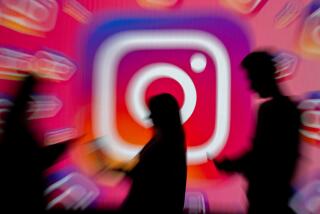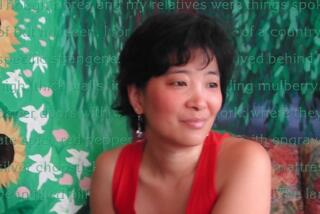After a decade of fear, we’re connected to writing in new ways
This is a decade that ended much as it began: with anxiety over technology and a feeling that the world as we know it might be coming to an end. Remember? Ten years ago, we were dealing with Y2K anxiety, and even the most skeptical of us -- if we’re honest -- must admit to having had moments of tension amid the manufactured hype. What if the computers had stopped working? What if our entire way of living had been derailed by a bit of code? If these questions seem quaint now, perhaps they offer a bit of context, a perspective on what we’re facing 10 years later, especially when it comes to publishing and books.
In the landscape of literature, after all, the decade just now coming to a close seems destined to be remembered as the moment when everything fell apart. That such an assessment is more than a bit premature is entirely beside the point: We are in a panic over . . . everything. Will the structure of publishing survive? What about the culture of reviews and criticism? And how do we cope with the influence of e-books and the Web?
That people are still reading, in large numbers and across all manner of formats, seems to be the least of our concerns. In January, the National Endowment for the Arts released a study that (despite considerable internal flaws) found so-called literary reading on the rise in the United States for the first time in more than a decade; although I dispute the study’s methodology, I agree with its conclusions, which suggest that reading isn’t going anywhere. According to the NEA, more than 112 million people are literary readers (that is, readers of “novels and short stories, plays, or poems”), a number that only increases when you include nonfiction, graphic novels, genre literature and e-books.
So if reading’s not the issue, what is everybody worried about? It is some kind of Y2K-style hysteria, in which the idea of change provokes millennial-type anxieties. We expect these anxieties in a decade leading up to a new millennium, not in a decade following, but if you trace the arc of the last 10 years, that’s how it has been. Y2K, the disputed 2000 presidential election, 9/11, the wars in Afghanistan and Iraq, Hurricane Katrina, economic disorder, even the rise of Barack Obama: All of these contribute to an era supersaturated with upheaval, sped up, in a constantly evolving transitional mode. Against such a backdrop, is it any wonder that an industry in disarray -- the print industry -- would see change as danger, chaos as risk?
Don’t get me wrong. Reading and writing face significant challenges in a hyper-networked society in which the very notion of narrative is fragmenting and our sense of story (story as shared heritage, story as common territory) has become badly frayed. At its worst, this fraying leads to the birtherson one side and the 9/11 conspiracy theorists on the other, extremists who listen only to their own propaganda and have no investment in any agreed-upon sense of factuality or truth.
Yet every culture has its fringes; more telling is the middle ground. If we look back at the books of the last 10 years, they’re not all that different from the books of the 10 years before that: fiction that deals with social and personal issues, investigative nonfiction that seeks to explain the world. As they have always done, the best books -- I’m thinking about Jonathan Franzen’s “The Corrections,” Joan Didion’s “The Year of Magical Thinking,” Philip Roth’s “Everyman,” E.L. Doctorow’s “The March,” Jane Smiley’s “Thirteen Ways of Looking at the Novel” -- take the vertical plunge.
Indeed, in the middle of the decade, books provided the kind of intensive reporting that many mainstream media outlets had all but abdicated, delving into electoral politics, terror networks and military adventurism. Lawrence Wright’s “The Looming Tower,” Jane Mayer’s “The Dark Side,” Barton Gellman’s “Angler”: Books such as these brought us the news, and there’s no reason to believe that’s going to change.
What has changed is our sense of text as fixed, not fluid, as something solid to which we can return again and again. That’s the influence of the Web, of course, where story has no end and no beginning, and readers are not passive but play a determining role. This is scary to a certain way of thinking, but I want to look in the opposite direction, to suggest that what is more compelling is how this opens up the possibilities.
Writing and reading are about engagement, about participating in a conversation, and inasmuch as technology can play a role in this interaction, it only draws more people in. How does the screen change things? This should have been the question of the last decade, but it appears it will unavoidably be the question of the next. What kind of platforms -- social networks, Web, print, multimedia -- are we looking at? And how do we move flexibly among them, using each according to its ability and taking from each according to our need?
Earlier this year, I attended a demonstration of an Internet-based “book” software called Sophie. With it, a writer can lay out hundreds of thousands of words of text -- an entire book, in other words -- in an interactive environment that allows live links, annotation, video and audio. What was striking was that the finished product looked like a book, with designed and laid-out pages and inset illustrations, but it functioned with the limitless interconnectivity of the Web. “I want to write my next book in that,” I said to a friend as we left the presentation, and all these months later, I still do. But now, I want to read in it also, to see how technology alters the literary experience, how evolution reinvents the world.
That’s not to say I don’t treasure books; I do. I read them, I write them, I live among them; I can’t imagine a world in which they do not exist. But more to the point, I treasure writing, the engagement of it, the immersion in the world.
These last 10 years have given us much to immerse in, as the next 10 will, I’m sure -- although somehow, one hopes, less beset by anxieties, millennial or otherwise.
Ulin is book editor of The Times.
More to Read
The biggest entertainment stories
Get our big stories about Hollywood, film, television, music, arts, culture and more right in your inbox as soon as they publish.
You may occasionally receive promotional content from the Los Angeles Times.






